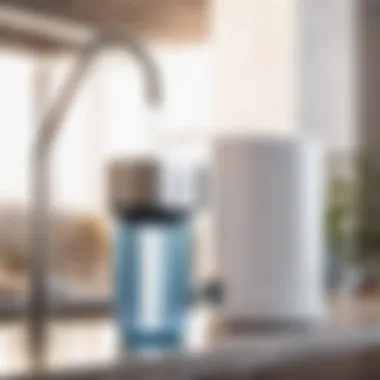Discover the Crucial Role of a Home Water Filtration System for Health and Safety


Materials:
- Drinking water filtration system unit (specify model and capacity)
- Water supply line
- Faucet
- Filter cartridges (specific to the unit)
- Mounting hardware
- Teflon tape
DIY Steps:
- Choose the Right System: Research and select a drinking water filtration system that meets your household's needs and size. Consider factors like filtration type, capacity, and maintenance requirements.
- Locate Water Source: Identify the main water supply line in your home where you will install the filtration system. Shut off the water supply before starting any work.
- Assemble Components: Unpack the filtration system unit and organize all components. Install the filter cartridges according to the manufacturer's instructions.
- Mounting Process: Securely mount the filtration system unit on the chosen location. Use the provided mounting hardware and ensure it is stable and level.
- Connect Water Supply: Attach the water supply line to the inlet of the filtration system. Use Teflon tape on the connections to prevent leaks.
- Install Faucet: If not included, install a dedicated faucet for filtered water. Position it near the sink for easy access and connect it to the system.
- Flush the System: Before use, flush the system by running water through it for a few minutes to remove any air or loose particles.
Technical Aspects:
- Tools Needed: Adjustable wrench, screwdriver, tape measure
- Timing Specifics: Allow 1-2 hours for complete installation
- Critical Techniques: Properly sealing connections with Teflon tape, ensuring secure mounting
Troubleshooting Tips:
- Low Water Pressure: Check for clogs in the filter cartridges or connections, and replace as needed.
- Leaking Connections: Tighten fittings and ensure proper sealing with Teflon tape.
- Strange Tastes or Odors: Replace filter cartridges or check for contaminants in the water supply.
Introduction
In the realm of modern living, the importance of having a robust drinking water filtration system cannot be overstated. This article serves as a guiding beacon, shedding light on the crucial role that these systems play in maintaining the health and well-being of households. By delving into the myriad benefits and considerations associated with water filtration, readers will gain a comprehensive understanding of why investing in clean drinking water is paramount for a thriving home environment.
Understanding the Need for Clean Water
The Role of Water in Our Daily Lives
Water stands as the cornerstone of human existence, being indispensable for various daily activities such as cooking, cleaning, and hydration. Its significance in nourishing our bodies and sustaining life underscores its irreplaceable nature. Within the context of this article, the discussion of water's pivotal role serves to underline the essential need for clean, uncontaminated water sources.
Implications of Contaminated Water
Contamination of water sources poses severe risks to public health, leading to a range of waterborne diseases that can have detrimental effects. The contamination of water sources by pollutants and toxins highlights the urgency of implementing effective filtration systems. Understanding the ramifications of contaminated water underscores the necessity of safeguarding drinking water through filtration systems.
Introduction to Drinking Water Filtration Systems


Definition and Purpose of Filtration Systems
At the core of drinking water filtration systems lies their defining purpose: to eliminate impurities and contaminants from water, ensuring its purity and safety for consumption. This aspect is not only beneficial but imperative in promoting good health and preventing water-related illnesses. By embracing filtration systems, households can proactively address water quality concerns and prioritize the well-being of their residents.
Contaminants Filtered
From heavy metals to microorganisms, drinking water filtration systems are adept at removing a diverse array of contaminants. The thorough filtration process ensures that water emerging from these systems is free from potentially harmful substances, guaranteeing a superior quality of water for everyday usage. Exploring the types of contaminants filtered unveils the comprehensive protection provided by these systems, making them a vital asset in maintaining a healthy living environment.
Benefits of Using a Filtration System
In this section, we will delve into the crucial role that utilizing a filtration system plays in ensuring the cleanliness and safety of drinking water in households. The significance of having a filtration system installed goes beyond just convenience; it directly impacts the quality of water consumed daily. By exploring the benefits of using a filtration system, we aim to shed light on why it is a fundamental investment for any household seeking to prioritize their health and well-being.
When considering the advantages of utilizing a filtration system, one of the primary aspects to acknowledge is the improved water quality it provides. This improvement stems from the system's ability to eliminate harmful substances present in tap water, consequently enhancing the overall taste and odor of the water. Furthermore, apart from merely enhancing taste, the removal of impurities ensures that the water remains free from contaminants that could potentially jeopardize one's health.
Moving forward, we will delve into the specifics of how a filtration system contributes to improved water quality by focusing on two key elements: the removal of harmful substances and the enhancement of taste and odor.
Improved Water Quality
Removal of Harmful Substances
The specific aspect of the removal of harmful substances by a filtration system is a pivotal function that ensures the water ingested is clean and safe. By employing various filtration techniques such as activated carbon and reverse osmosis, these systems effectively eliminate impurities such as lead, chlorine, bacteria, and other pollutants that may be present in the water supply. This process not only purifies the water but also safeguards individuals from potential health risks associated with consuming contaminated water.
The unique feature of the removal of harmful substances lies in its ability to target a wide range of contaminants, thus offering a comprehensive solution to water purification. This feature is particularly advantageous for households seeking a reliable and efficient method to guarantee the cleanliness of their drinking water. However, it is essential to consider the maintenance requirements of these systems to ensure continuous protection against harmful substances.
Enhanced Taste and Odor
Another significant aspect of improved water quality attributed to filtration systems is the enhancement of taste and odor. By eradicating undesirable smells and flavors commonly found in tap water due to impurities, filtration systems revitalize the drinking water, making it more palatable and appealing. This enhancement not only improves the overall drinking experience but also encourages individuals to consume more water, promoting better hydration and health.
The unique feature of enhanced taste and odor provided by filtration systems elevates the drinking water to a standard that surpasses conventional tap water, offering a refreshing and clean option for daily hydration. However, it is essential to note that some individuals may have preferences for specific types of filtration methods based on their sensory perceptions and needs.
Types of Filtration Systems


In the realm of drinking water filtration systems, understanding the different types available is crucial for homeowners looking to enhance the quality of their water supply. The section on 'Types of Filtration Systems' serves as a cornerstone in this article, shedding light on the importance of selecting the right system to meet specific needs.
When diving into this topic, it is essential to explore the specific elements that differentiate various filtration systems. By highlighting the benefits of each type and considering important factors like filtration efficiency, maintenance requirements, and initial costs, readers can make informed decisions regarding which system aligns best with their household requirements.
Furthermore, discussing the considerations about types of filtration systems includes examining factors such as water source, prevalent contaminants, flow rate, and installation feasibility. Each element plays a pivotal role in determining the most suitable filtration system for different households, ensuring the provision of clean and safe drinking water.
Activated Carbon Filters
Mechanism of Action:
Activated carbon filters stand out for their unique mechanism of action, which revolves around adsorption. This process involves contaminants adhering to the surface of the activated carbon, effectively trapping impurities and enhancing water quality. The key characteristic of this mechanism is its ability to remove a wide range of pollutants, including chlorine, volatile organic compounds (VOCs), and sediments, making it a popular and beneficial choice for households aiming to improve water taste and purity.
One of the distinct advantages of activated carbon filters is their versatility in targeting common water impurities without requiring intricate maintenance procedures. However, a potential disadvantage lies in the limited capacity of these filters to remove certain contaminants like heavy metals and dissolved solids, necessitating additional filtration methods for comprehensive purification.
Commonly Filtered Contaminants:
Activated carbon filters excel at targeting commonly found contaminants in drinking water, such as chlorine, volatile organic compounds (VOCs), and unpleasant odors. By effectively removing these impurities, these filters enhance the overall quality and taste of water, promoting a healthier drinking experience. The key characteristic of this service is its ability to address a broad spectrum of pollutants, ensuring that households receive clean and refreshing water for various uses.
The unique feature of activated carbon filters lies in their ability to reduce potentially harmful substances, thus safeguarding the health of individuals consuming the treated water. However, limitations may arise in instances where the filters become saturated, diminishing their effectiveness in purifying contaminants and necessitating timely replacement to maintain optimal filtration performance.
Reverse Osmosis Systems
How Reverse Osmosis Works:
The mechanism of reverse osmosis involves the application of pressure to push water through a semipermeable membrane, effectively separating impurities from the water molecules. This process ensures the removal of contaminants such as dissolved solids, heavy metals, and pathogens, thereby yielding clean and purified drinking water. The key characteristic of reverse osmosis lies in its ability to deliver high-quality water by eliminating a wide range of impurities, making it a popular choice for households seeking comprehensive filtration solutions.
The unique feature of reverse osmosis systems is their capacity to produce purified water for drinking and cooking purposes, enhancing the overall water quality in homes. However, disadvantages may include the significant water wastage associated with the filtration process, highlighting the importance of efficient water usage and system maintenance.
Removal of Impurities:
Reverse osmosis systems excel in removing various impurities present in drinking water, including dissolved solids, heavy metals, bacteria, and viruses. By effectively eliminating these contaminants, these systems ensure that households receive clean and safe water for daily consumption. The key characteristic of this service is its ability to provide a multi-barrier approach to water purification, offering comprehensive protection against a wide array of pollutants.


The unique feature of the removal of impurities through reverse osmosis systems lies in the production of high-quality drinking water free from harmful substances. Nevertheless, challenges may arise in terms of energy consumption and maintenance requirements, emphasizing the need for regular system checks and upkeep to sustain optimal filtration performance.
Maintenance and Considerations
In this section on Maintenance and Considerations, we delve into the crucial aspects of ensuring the optimal performance of your drinking water filtration system. Understanding the significance of proper maintenance routines and considerations is paramount in preserving water quality and safeguarding your health and well-being. By implementing regular maintenance practices and considering key factors before making purchasing decisions, you can maximize the efficiency and longevity of your filtration system.
Routine Maintenance
Filter Replacement
Filter replacement is a fundamental task in maintaining the effectiveness of your filtration system. Regularly changing filters ensures the removal of contaminants and impurities, thereby enhancing the quality of the filtered water. The key characteristic of filter replacement lies in its ability to prevent the buildup of harmful substances in the filtering mechanism, guaranteeing the continued delivery of clean and safe drinking water. This proactive maintenance approach is a popular choice for households aiming to uphold water quality standards consistently. One unique feature of filter replacement is its simplicity and ease of implementation, making it a convenient maintenance solution. While filter replacement offers numerous advantages, it is essential to note the potential disadvantages of negligence, such as decreased filtration efficiency if not performed routinely.
Cleaning Procedures
Cleaning procedures play a vital role in the overall maintenance of a drinking water filtration system. Proper cleaning helps prevent the accumulation of residues and sediments within the system, ensuring its optimal performance. The key characteristic of cleaning procedures is their ability to clear any blockages or contaminants that may hinder the filtration process, thereby promoting continued functionality. This maintenance practice is a beneficial choice for this article as it contributes to maintaining water quality and extending the lifespan of the filtration system. A unique feature of cleaning procedures is their ability to address specific issues such as clogs or bacterial growth, enhancing the overall efficiency of the system. Despite the advantages of cleaning procedures, it is important to exercise caution during the cleaning process to avoid damaging sensitive components of the filtration system.
Factors to Consider Before Buying
Water Quality Analysis
Water quality analysis is a critical aspect to consider before investing in a drinking water filtration system. Conducting a thorough analysis allows you to identify the specific contaminants present in your water supply, aiding in the selection of an appropriate filtration system. The key characteristic of water quality analysis lies in its ability to provide valuable insights into the composition of your water, guiding you towards choosing the most suitable filtration technology. This analytical process is a beneficial choice for this article as it empowers homeowners to make informed decisions regarding their water treatment needs. One unique feature of water quality analysis is its customizability, enabling tailored filtration solutions based on individual water quality requirements. While water quality analysis offers significant advantages in system selection, one must consider the time and cost implications associated with obtaining professional water testing services.
Budgetary Constraints
Budgetary constraints serve as another crucial factor to consider when purchasing a drinking water filtration system. Understanding your financial limitations helps narrow down options and select a system that aligns with your budget constraints. The key characteristic of budgetary constraints is their function in guiding you towards cost-effective filtration solutions without compromising on quality. This consideration is a popular choice for this article as it emphasizes the importance of balancing performance with affordability in choosing a filtration system. An exceptional feature of budgetary constraints is their role in fostering fiscal responsibility and ensuring long-term cost savings through prudent investment in a quality filtration system. While budgetary constraints offer advantages in prudent decision-making, it is essential to weigh the initial costs against the long-term benefits of improved water quality and health outcomes.
Conclusion
Ensuring Safe Drinking Water
Impact on Overall Health
In the context of drinking water filtration systems, ensuring safe drinking water is directly linked to improved health outcomes. The impact on overall health is profound, as contaminated water can lead to various waterborne diseases and long-term health issues. Filtering out harmful substances and toxins not only protects individuals from immediate risks but also contributes to their overall well-being. By prioritizing the purity of drinking water, individuals can safeguard their health and that of their loved ones. Emphasizing the unique feature of enhancing water quality through filtration systems sets them apart as a popular and beneficial choice for maintaining a healthy lifestyle.
Sustainable Solutions
Sustainable solutions play a vital role in the ongoing quest for clean drinking water. Implementing eco-friendly practices in water filtration systems ensures a continuous supply of safe water without compromising the environment. The key characteristic of sustainable solutions lies in their ability to provide long-term benefits while reducing the ecological footprint. By adopting sustainable practices such as efficient filter replacement and minimizing water wastage, households can contribute to environmental preservation. Understanding the advantages of sustainable solutions in filtration systems highlights the importance of responsible water management in achieving a balance between human needs and environmental conservation.







